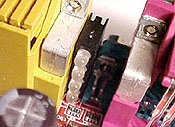Overall MSI's 845Pro2-R has proven itself to be a very stable motherboard during our evaluation. The BIOS features will satisfy the tweaker at heart, but given the limitations of SDRAM there really isn't much cause to buy this motherboard with the intention of overclocking anything. Overclockers are much better served at the moment by AMD's processor and supporting mainboard solutions.
Unlike other Pentium 4 solutions the powersupply required for
this board need only have the extra 4-pin 12V power connector. The socket
423 form factor is basically dead, and you would be quite silly to buy any
motherboards that support it. During Comdex 2001 not one single manufacturer had any new
boards scheduled for release supporting this retired form factor.
 The onboard audio feature via C-Media's chipset is very good for desktop computer speakers by falls flat when headphones are connected up to it. For total system integrators though, extra solutions like this are a simple way to cut down total costs and offer the end-user a decent sound system. Static
and hissing is really annoying when you are listening to music with just a
pair of headphones so do yourself a favor and get good audio card. The Philips Acoustic
Edge works great for us.
The onboard audio feature via C-Media's chipset is very good for desktop computer speakers by falls flat when headphones are connected up to it. For total system integrators though, extra solutions like this are a simple way to cut down total costs and offer the end-user a decent sound system. Static
and hissing is really annoying when you are listening to music with just a
pair of headphones so do yourself a favor and get good audio card. The Philips Acoustic
Edge works great for us.
Between the
MSI 845Pro2-R and the Epox 4B2A, it would seem the benchmarks point to the
Epox solution as the board with the best performance. As we mentioned the
difference is slight and may be insignificant when you compare features -
where the MSI solution wins hands down. IDE RAID is an
effective means of insuring data redundancy, and the integration of
D-LED is a bonus to anyone tasked with solving baffling computer boot
problems. In the end, the numbers speak for themselves, and the feature lists
between the two i845 solutions are persuasive so it really comes down to a personal choice. Of course, the performance users and gamers will always just say "go AMD," but if you are more comfortable with the Pentium 4 at least now you know what to
expect.
